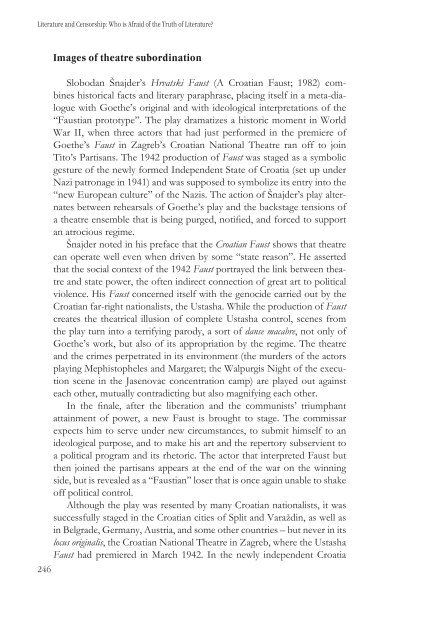Literatura in cenzura - Društvo za primerjalno književnost - ZRC SAZU
Literatura in cenzura - Društvo za primerjalno književnost - ZRC SAZU
Literatura in cenzura - Društvo za primerjalno književnost - ZRC SAZU
- No tags were found...
You also want an ePaper? Increase the reach of your titles
YUMPU automatically turns print PDFs into web optimized ePapers that Google loves.
Literature and Censorship: Who is Afraid of the Truth of Literature?246Images of theatre subord<strong>in</strong>ationSlobodan Šnajder’s Hrvatski Faust (A Croatian Faust; 1982) comb<strong>in</strong>eshistorical facts and literary paraphrase, plac<strong>in</strong>g itself <strong>in</strong> a meta-dialoguewith Goethe’s orig<strong>in</strong>al and with ideological <strong>in</strong>terpretations of the“Faustian prototype”. The play dramatizes a historic moment <strong>in</strong> WorldWar II, when three actors that had just performed <strong>in</strong> the premiere ofGoethe’s Faust <strong>in</strong> Zagreb’s Croatian National Theatre ran off to jo<strong>in</strong>Tito’s Partisans. The 1942 production of Faust was staged as a symbolicgesture of the newly formed Independent State of Croatia (set up underNazi patronage <strong>in</strong> 1941) and was supposed to symbolize its entry <strong>in</strong>to the“new European culture” of the Nazis. The action of Šnajder’s play alternatesbetween rehearsals of Goethe’s play and the backstage tensions ofa theatre ensemble that is be<strong>in</strong>g purged, notified, and forced to supportan atrocious regime.Šnajder noted <strong>in</strong> his preface that the Croatian Faust shows that theatrecan operate well even when driven by some “state reason”. He assertedthat the social context of the 1942 Faust portrayed the l<strong>in</strong>k between theatreand state power, the often <strong>in</strong>direct connection of great art to politicalviolence. His Faust concerned itself with the genocide carried out by theCroatian far-right nationalists, the Ustasha. While the production of Faustcreates the theatrical illusion of complete Ustasha control, scenes fromthe play turn <strong>in</strong>to a terrify<strong>in</strong>g parody, a sort of danse macabre, not only ofGoethe’s work, but also of its appropriation by the regime. The theatreand the crimes perpetrated <strong>in</strong> its environment (the murders of the actorsplay<strong>in</strong>g Mephistopheles and Margaret; the Walpurgis Night of the executionscene <strong>in</strong> the Jasenovac concentration camp) are played out aga<strong>in</strong>steach other, mutually contradict<strong>in</strong>g but also magnify<strong>in</strong>g each other.In the f<strong>in</strong>ale, after the liberation and the communists’ triumphantatta<strong>in</strong>ment of power, a new Faust is brought to stage. The commissarexpects him to serve under new circumstances, to submit himself to anideological purpose, and to make his art and the repertory subservient toa political program and its rhetoric. The actor that <strong>in</strong>terpreted Faust butthen jo<strong>in</strong>ed the partisans appears at the end of the war on the w<strong>in</strong>n<strong>in</strong>gside, but is revealed as a “Faustian” loser that is once aga<strong>in</strong> unable to shakeoff political control.Although the play was resented by many Croatian nationalists, it wassuccessfully staged <strong>in</strong> the Croatian cities of Split and Varažd<strong>in</strong>, as well as<strong>in</strong> Belgrade, Germany, Austria, and some other countries – but never <strong>in</strong> itslocus orig<strong>in</strong>alis, the Croatian National Theatre <strong>in</strong> Zagreb, where the UstashaFaust had premiered <strong>in</strong> March 1942. In the newly <strong>in</strong>dependent Croatia
















